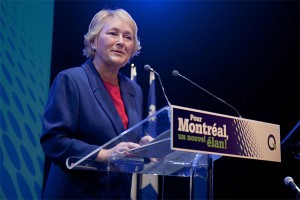Quebec election could revive questions of national unity

PQ leader Pauline Marois at a symposium in 2010. Photo: Parti Quebecois, Creative Commons, some rights reserved
In case you missed it, an election has been called for Quebec, with a vote scheduled for April 7.
According to polls and political analysts, top issues include the usual mix, such as the economy, jobs and taxes. That’s usually plenty, but there’s also a large provincial deficit, crumbing infrastructure and various social issues, including long-standing corruption scandals. (A summary of provincial election coverage from the Montréal Gazette can be found here.)
Such elections are normally of greatest interest within the province in question. This one, though, could easily have profound implications for all of Canada.
Here’s a thumbnail-sketch. The Parti Québécois, headed by Pauline Marois, won a minority government back in September of 2012, meaning it could not act without some support from one or more opposing parties. Marois says government is at a stalemate and she needs to seek a majority. But a majority win for that party could bring the question of national unity back to the fore.
Why? Well, two reasons. First, a key campaign plank of the PQ is the passage of Bill 60, the Quebec Charter of Values, a highly controversial piece of legislation which would ban the wearing of conspicuous religious symbols for public employees. Some experts say the bill’s provisions stand in direct conflict with the Canadian Charter of Rights and Freedoms.
Second is the cause of separatism, that Quebec should exist as its own country. Some observers say that long-held dream is fading, due to shifts in age and population. Sovereignty just doesn’t seem to carry the same appeal among younger voters, and it’s not overly attractive to Quebec’s growing urban immigrant population. In short, that cause may be at a now-or-never juncture.
As discussed by Jeffery Simpson in the Globe and Mail:
How to respond to the latest threat of Quebec secession will be an unavoidable issue for all federal parties. Which one will benefit remains unknown.
What can be predicted with some certainty is the rest of Canada’s initial reaction to a PQ victory: annoyance mixed with boredom and intransigence. “Not this again” will be the widespread response.
If Quebeckers believe that voting PQ means putting a knife to Canada’s throat, they should think again. The ROC [rest of Canada] is fed up with these threats. As Rhett Butler said to Scarlett O’Hara in Gone With The Wind, “Frankly, my dear, I don’t give a damn.”
Thus far the federal parties and their leaders are treading very cautiously. So much so that Michael Den Tandt of Postmedia News asks: “In Quebec election fight, who will speak for Canada?
…it’s just not good enough, this time out, for federal politicians or any federalists at all to sit on their hands, or on the sidelines, whatever their tactical or strategic rationales may be, and hope for the best. They should make the case for Canada; they should tell Quebecers now, not later, why the Charter of Quebec values is wrong, what the consequences of another referendum will be, and that a vote for the PQ is a vote for trouble, at best, and the breakup of the country, at worst. The stakes have not been higher, since 1995. Canadians have a right to expect that someone, speaking on their behalf, will say so.
Voters in any given place naturally resent outside pressure or interference. That’s especially true for Quebec, which does have history and concerns that are not shared by the rest of Canada. Hence the abundance of tip-toeing caution.
CBC says Conservative Prime Minister Stephen Harper has spoken privately with NDP Opposition Leader Thomas Mulcair on the issue. Huffington Post Canada reported that those private conversations extended to provincial leaders as well. For those who don’t remember it in person, the same Huff Post article includes a pictorial retrospective of the last referendum on separation in 1995.
Those are some of the reasons why this election may loom larger than most in Quebec and Canada.
Tags: canada, Parti Quebecois, politics, Quebec, sovereignty








According to a report I heard on the CBC Saturday, the PQ also wants to institute a set of much more draconian French language laws in Quebec, practically outlawing public displays of English on business advertising. E.g., no more signs like, “Bonjour!/Hi!”
Good luck with that one in Montreal.
Well remember that the sovereigntist PQ may govern the province but received less than 32% of the vote in the last election, not a good basis to launch a sovereignty referendum (in the general election before the nearly-successful 1995 referendum, the PQ had 45%. Non-francophones will be very motivated to fight a government which is perceived to be in open warfare against anglophones. People still remember former PQ premier Jacques Parizeau’s infamous “money and the ethnic vote” comment after the last referendum. The PQ has done little to counter the impression that it wants an overtly chauvinist state.